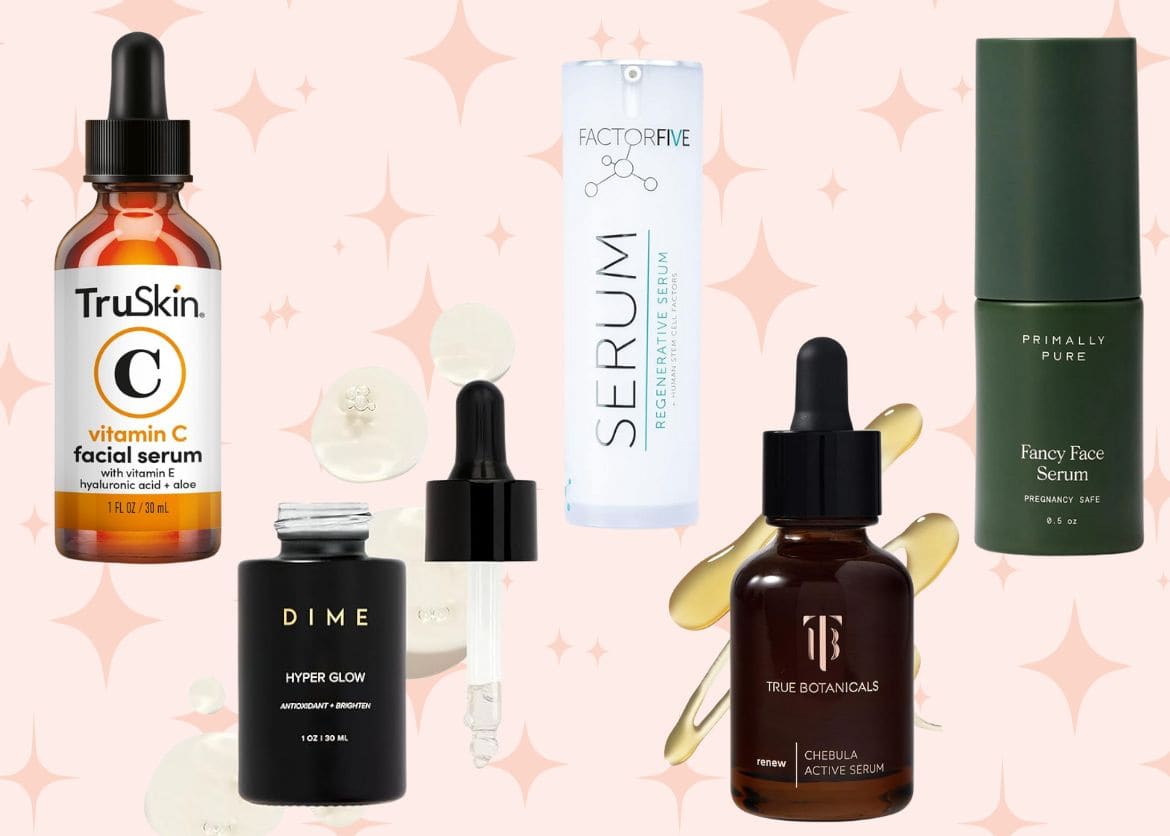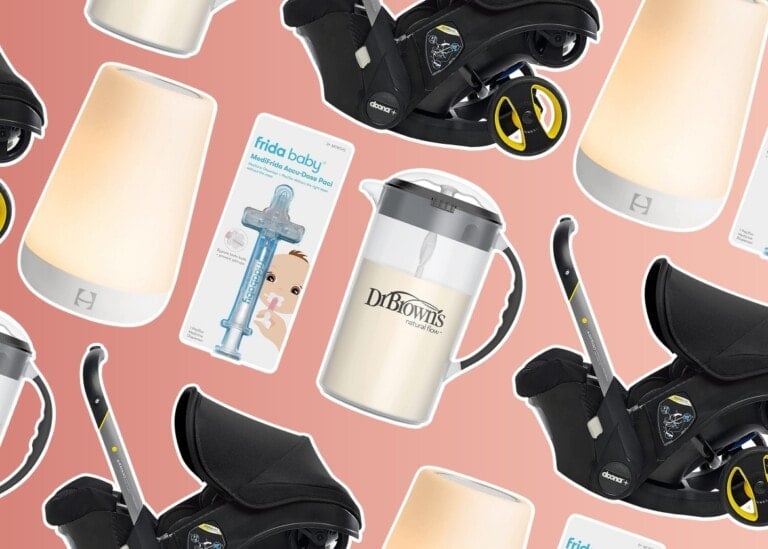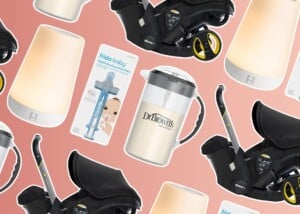Pregnancy comes with many changes — no more Wine Down Wednesdays, sushi boats, deli sandwiches, and venti Frappuccinos. Not only do you have to watch what you put in your body but also what you put on it. Finding pregnancy-safe skincare products is essential since your skin is the largest organ and very porous. Anything you put on your face and body is easily absorbed. That includes your prized face washes, moisturizers, serums, and sunscreens you use daily to keep your skin healthy and free of blemishes and dryness, thanks to pregnancy hormones.1,2,38
Many skin care products contain harmful chemicals, so we’ve created a quick guide that breaks down safe vs. harmful ingredients. We’re also sharing the pregnancy-safe products we love and trust!
Common Skin Changes During Pregnancy
So, how exactly does pregnancy affect your skin? You should be aware of these common skin changes that can occur while you’re pregnant:
1. Melasma

Melasma is often referred to as chloasma or the “mask of pregnancy.” This skin condition causes brown or tan patches on the face due to an increase in the hormones estrogen and progesterone. Expectant moms may notice these blotches above their upper lip or on their cheeks, nose, forehead, chin, or arms.3
While not all women get melasma, some are genetically predisposed, which can increase their chances. Some moms-to-be may have a family history of this condition, while others who have a light-brown complexion and were born in an area with high sun exposure are more prone to developing it. Women who have taken birth control pills are also more likely to develop this hyperpigmentation due to their high number of hormones.4
2. Acne

Unfortunately, pregnancy isn’t always all about the glow. Thanks to increased hormones in your body during the first trimester, your oil glands produce more natural oils and cause clogged pores and dreaded breakouts. If you suffered from acne before your pregnancy, you’re at higher risk of experiencing acne during pregnancy as well. Up to 43% of women experience acne while pregnant.5,6
3. Stretch Marks

Pregnancy and stretch marks almost feel synonymous with one another. Close to 90% of pregnant moms develop stretch marks during their pregnancy due to genetics, skin type, age, and birth weight. For many moms-to-be, stretch marks appear on their belly since it stretches to make room for their growing baby. These “tiger stripes” — as some moms lovingly call them — can be pink, red, or a faint color depending on your skin tone. They can also appear on your glutes, breasts, and thighs.7,8
4. Linea Nigra

Linea nigra, or “the pregnancy line,” is a dark vertical line that extends from your pubic bone up to your belly button during pregnancy. With each trimester, the line may darken and become more visible, especially for those with a darker complexion. Typically, around 20 weeks of gestation, a linea nigra will become noticeable.9
Skincare Product Ingredients To Avoid While Pregnant
If you’re unsure whether the skincare products currently crowding your vanity are pregnancy-safe, here’s a short list of ingredients that can be detrimental to your little one. Double-check your product labels to see if any of these substances are listed:
1. Retinoids
Retinoids are derived from vitamin A and are used to treat acne, reduce fine lines and wrinkles, and improve skin texture. While they’re great for keeping your skin clear and youthful, they can cause serious harm to your growing baby. Studies have found that high doses of retinoids during pregnancy can increase the risk of fetal retinoid syndrome, characterized by a slew of physical birth defects in infants. Some differences range from heart abnormalities and excess fluid around a baby’s brain to growth delays and an increased chance of a cleft palate.10,11
While some over-the-counter skincare products may contain small amounts of retinoids, it’s best to avoid them altogether. Keep an eye out for any vitamin A derivatives in topical treatments, including retinol, retinyl, and tretinoin, as well as prescribed oral medications, like isotretinoin.12,13
2. Salicylic Acid
Although there’s insufficient research to determine dosage amounts and potential fetal risks associated with salicylic acid during pregnancy, some experts recommend that pregnant moms add this acne fighter and exfoliant to their “do not use” list.14 The concern? Salicylic acid is related to aspirin, which is linked to various risks (including pregnancy loss and congenital defects) when taken in high doses. While research hasn’t backed it, there may be a possibility that salicylic acid could have similar effects.15,16
3. Oxybenzone
Oxybenzone is an active ingredient commonly found in commercial sunscreens. It’s received a lot of backlash in recent years, with studies highlighting its effect on the environment and the reproductive health of animals. Oxybenzone is known to disrupt the function of organs in the body, such as the skin, kidneys, brain, and endocrine system. This chemical can also pass through the skin and the placenta, causing harmful effects on the development of a fetus during pregnancy.17,18,19
4. Hydroquinone
Hydroquinone is a topical skin-lightening agent for treating hyperpigmentation, such as dark spots and patches. While hydroquinone is highly effective at lightening the skin, it has received negative attention from the FDA, which has banned the use of the ingredient in over-the-counter products and deemed it unsafe for pregnant and non-expectant consumers.20,21 Hydroquinone limits the skin’s natural melanin production and is considered a carcinogenic ingredient linked to rashes and eye injuries. More serious issues include thyroid disorder, leukemia, liver damage, and exogenous ochronosis (a permanent skin discoloration that’s a blue-black hue).22,23,24
5. Phthalates
Phthalates, a synthetic chemical that makes plastics soft and flexible, are used in many products that families use daily — hair products, cosmetics, toys, food packaging, detergents, you name it. Unfortunately, plastic additives are known to be endocrine disruptors, meaning they can wreak havoc with normal hormone functions in both moms and babies.25,26
A study from the National Institutes of Health (NIH) also discovered that pregnant mothers exposed to multiple phthalates during pregnancy had a higher chance of preterm birth. Additional research has identified several other health risks, such as preeclampsia, maternal glucose disorders, and interference with thyroid functionality in moms, leading to growth restriction, behavioral and cognitive disorders, and issues with the neuroendocrine system in infants.26,27,28
What To Look for in Skincare Products During Pregnancy
Although you need to part ways with a handful of ingredients (at least for the next nine months of your pregnancy and if you plan to breastfeed), there’s a silver lining for your skin. The American College of Obstetricians and Gynecologists (ACOG) has confirmed several safe additives to use in your pregnancy skincare routine so you don’t have to completely say goodbye to your mornings and nights of pampering. Here are five ingredients that won’t bring harm to you and your baby:8
1. Benzoyl Peroxide
Benzoyl peroxide prevents acne-causing bacteria from growing on the skin and is considered safe for pregnant moms. Only a small amount of the antiseptic is absorbed through the skin using topical, over-the-counter acne products.2,29,30
2. Hyaluronic Acid
Hyaluronic acid is on the “yes” list of ingredients moms can use while carrying. As a naturally occurring substance that the body produces in the eyes, joints, and skin, hyaluronic acid is a holy grail for pregnant mommas. It helps retain the skin’s moisture, flexibility, and elasticity — all common issues expectant mothers struggle with throughout their pregnancy.14,30,31
3. Glycolic Acid
Glycolic acid is a type of alpha hydroxy acid (AHA) that acts as an exfoliant for the skin to remove dead skin cells, treat acne and acne scars, and reduce spotting (dark patches, freckles, and sunspots). While the ACOG has given glycolic acid the green light as a pregnancy-safe ingredient, it’s important to note that products should contain concentrations lower than 10%.32,33
4. Vitamin C
If you’re concerned about hyperpigmentation, vitamin C is a safe alternative in creams or serums to lighten your skin while pregnant. Vitamin C also has anti-aging properties that can protect your skin against damage from UV rays and also keep your skin looking younger with its ability to increase collagen in the skin.34,35
5. Azelaic Acid
Azelaic acid is generally safe to use and is another substitute to help with inflamed acne and hyperpigmentation. Keep in mind that there aren’t enough controlled studies on the usage of azelaic acid during pregnancy, but animal studies haven’t reported harmful effects on fetuses or newborns. It’s recommended to use azelaic acid on small surface areas of your skin and to avoid it within the first trimester.14,36,37
Top Picks for Pregnancy-Safe Skincare Products
Here are the best pregnancy-safe skincare products you can use and why we love them, including our favorite cleansers, toners, exfoliants, moisturizers, serums, and sunscreens:
Cleansers

Using a cleanser is essential for maintaining healthy skin, especially during pregnancy, when hormonal changes can make your skin more prone to issues like acne, dryness, or sensitivity.39,40,66 It helps remove impurities on your skin accumulated throughout the day, preventing clogged pores and breakouts.41,42 Because dirt and oil can act as a barrier, a cleanser also allows serums, moisturizers, and treatments to penetrate your skin more effectively.43,44 Here are the top cleansers to use that are pregnancy-safe:
- Primally Pure Cleansing Oil: My favorite option! This organic oil balances the skin’s natural oils while gently removing makeup and impurities.
- CeraVe Hydrating Cleanser: It’s non-comedogenic and fragrance-free, and it contains ceramides and hyaluronic acid for hydration — without stripping the skin.
- DIME Gentle Jelly Cleanser: Free from harmful chemicals, this cleanser gently removes impurities and includes hydrating and soothing ingredients. I’ve personally used this product and loved how it feels and works.
- La Roche-Posay Toleriane Hydrating Gentle Cleanser: This is safe, soothing, and formulated for sensitive skin with niacinamide and glycerin for hydration and calming.
- Vanicream Gentle Facial Cleanser: This cleanser is ultra-gentle and free from common irritants like fragrances and dyes. It’s also extremely affordable and a great option for dry skin.
Toners

Using a toner as part of your skincare routine (including during pregnancy) offers several benefits, especially for maintaining balanced, healthy skin. It restores your skin’s pH balance and removes residual impurities by providing an extra layer of cleansing to ensure your skin is completely clean.45,46 Toner also tightens your pores and soothes and calms skin irritation.46 It’s a great addition to your pregnancy skincare routine. These are the toners I recommend trying:
- Thayers Alcohol-Free Witch Hazel Toner With Aloe Vera: This one balances your skin without drying it out, using natural astringents and soothing aloe.
- Primally Pure Everything Spray: Heal and tone with this everything spay! This multifunctional toner with hydrating and soothing ingredients helps heal, hydrate, and reduce inflammation.
- True Botanicals Renew Nutrient Mist: This one is super yummy. It contains antioxidants and hydrating botanicals that will nourish and balance your skin.
- DIME Super Skin Toner: This toner has gentle exfoliating and hydrating ingredients designed to balance and brighten the skin. I love its clean formula!
- Paula’s Choice Enriched Calming Toner: Fragrance-free and rich in antioxidants, this calming toner replenishes and soothes sensitive skin.
Exfoliants

While physical exfoliants (like scrubs) can be too harsh during pregnancy, other exfoliants that use lactic acid, glycolic acid, and azelaic acid are better to use and can be more effective.14,47,48,49 Exfoliating your skin helps to remove dead skin cells that accumulate on the surface, prevent and treat breakouts, and promote skin cell turnover, which can help fade pigmentation over time, improve skin texture, and stimulate cell renewal.50,51 Here are some of my favorites:
- True Botanicals At-Home Facialist Peel: This facial peel brightens dull skin and contains hydrating ingredients for a glass skin look.
- The Ordinary Lactic Acid 5% + HA: This is a milder exfoliator that gently exfoliates with lactic acid while hydrating with hyaluronic acid.
- First Aid Beauty Facial Radiance Pads: I love these gentle face exfoliating pads! They’re infused with glycolic and lactic acids for mild exfoliation.
- The Ordinary Azelaic Acid Suspension 10%: It exfoliates, fights inflammation, and brightens skin tone.
Moisturizers

Especially during pregnancy, using a moisturizer in your skincare routine is essential because hormonal changes can disrupt your skin’s natural balance. This can lead to increased dryness, sensitivity, or oil production.40,52,53 A good moisturizer helps restore and maintain your skin’s hydration barrier, preventing water loss and protecting against environmental irritants.43,54,55 It also soothes and calms pregnancy-related skin issues like redness, irritation, or tightness while providing a smooth base for other skincare products.43,55 Choosing a pregnancy-safe moisturizer ensures your skin stays nourished, promoting a healthy, glowing complexion during this transformative time. Here are the ones that I like:
- True Botanicals Renew Pure Radiance Oil: This bestselling, luxurious face oil moisturizes with essential fatty acids and antioxidants. I’ve used it and love it!
- Cetaphil Daily Hydrating Lotion: This one is an oil-free lotion that locks in moisture. It’s non-comedogenic, lightweight with hyaluronic acid for hydration, and safe for sensitive skin.
- Neutrogena Hydro Boost Water Gel Moisturizer: Packed with hyaluronic acid for intense hydration, this moisturizer is great for normal to oily skin. It’s a lightweight gel that feels cool on the skin and instantly refreshes.
- Biossance Squalane + Probiotic Gel Moisturizer: This gel moisturizer contains active probiotics that support a healthy microbiome for balanced skin. It hydrates and calms redness and irritation with squalane and is suitable for oily, acne-prone, or sensitive skin.
- DIME Dewy Day Cream: This lightweight and hydrating moisturizer contains antioxidants and is free of toxic ingredients. It’s perfect for everyday wear!
Serums

If you’re experiencing specific skin concerns like acne, dryness, dullness, hyperpigmentation, and sensitivity — all of which can be exacerbated by hormonal changes during pregnancy — consider adding a serum to your skincare routine.8,39,40,43,53,56,57,66 Serums have smaller molecules than moisturizers, allowing them to go deeper into the skin and deliver active ingredients more effectively.57,58 Pregnancy-safe serums containing ingredients like hyaluronic acid, vitamin C, or azelaic acid can hydrate, brighten, and improve skin texture without the use of harmful chemicals.57,59 Incorporating a serum allows you to address pregnancy-specific skin issues in a gentle but effective way, enhancing the overall health and appearance of your skin. Here are the pregnancy-safe serums that I recommend:
- Primally Pure Fancy Face Serum (Pregnancy): This is my top recommendation for pregnant mamas! It deeply hydrates and nourishes your skin with a blend of organic healing oils.
- TruSkin Vitamin C Serum: This one brightens your skin with vitamin C and includes hydrating ingredients like hyaluronic acid.
- FACTORFIVE Regenerative Serum: While it’s on the pricier side, this serum is wonderful. I’ve tested it and highly recommend it! It promotes skin regeneration using human stem cell-derived growth factors with copper peptides to help restore your skin.
- DIME Hyper Glow Serum: This vitamin C-based serum helps brighten and protect your skin.
- True Botanicals Chebula Active Serum: Combat aging and inflammation with this pregnancy-safe serum packed with antioxidants such as chebula. Chebula targets signs of aging, like minimizing the appearance of fine lines and wrinkles, evening skin tone, smoothing roughness, and giving the look of firmer and brighter skin.
Sunscreens

Hormonal changes can make your skin more susceptible to sun damage, including dark spots, melasma, and premature aging.8,39,60,61,62 This is why using sunscreen regularly is essential.39,61,62 UV rays can worsen hyperpigmentation (which is common during pregnancy), making it harder to fade over time.56,63 Sunscreen acts as a protective barrier, shielding your skin from harmful UVA and UVB rays while reducing the risk of skin cancer.64 Opting for a pregnancy-safe, mineral-based sunscreen ensures you’re protecting your skin without exposing yourself or your baby to potentially harmful chemicals.65 I recommend these sunscreens:
- Thinkbaby Safe Sunscreen SPF 50+: This reef-safe, 100% mineral-based sunscreen contains non-nano zinc oxide (which provides broad-spectrum UVA/UVB protection) and has no harmful chemicals.
- Blue Lizard Sensitive Mineral Sunscreen SPF 50+: Designed with dermatologists, this zinc oxide and titanium dioxide sunscreen provides head-to-toe sun protection. This sensitive mineral sunscreen has no skin-irritating chemicals, parabens, or fragrances.
- EltaMD UV Clear Broad-Spectrum SPF 46: This mineral-based sunscreen contains zinc oxide and niacinamide for redness reduction. It’s a great choice to reduce the appearance of blemishes and skin discoloration while protecting against UVA and UVB rays.
- True Botanicals Skin Barrier Sun Shield SPF 30: This lightweight, mineral-based skincare product has hydrating and antioxidant benefits, which are ideal for oily and blemish-prone skin.
Skincare Ingredient Combinations To Avoid
Before you start to use any of these skincare products, keep in mind that there are a couple of ingredient combinations to avoid:
- Benzoyl peroxide and vitamin C: These ingredients can neutralize each other, reducing their effectiveness.67 Benzoyl peroxide may also be too drying when paired with other actives.
- Exfoliating acids and benzoyl peroxide: Combining these can lead to dryness, irritation, and peeling, which may be more pronounced during pregnancy.40,68
This is why it’s good to simplify your routine and focus on gentle products that address your specific skin concerns. You can also patch test to see how your skin reacts before applying everywhere.
Pregnancy-Safe Skincare Routine
Once you have all the pregnancy-safe items for your skincare regimen, it’s helpful to know what order to use them in. Follow the steps below for your skincare routine. These will help with common pregnancy skin concerns such as hormonal acne, dryness, dullness, hyperpigmentation, and sensitivity:66
Morning Routine

You’ll want to use the products in this order for your morning routine:
- Cleanser
- Toner
- Serum
- Moisturizer
- Sunscreen
Evening Routine
At the end of the day, follow these steps for your skincare regimen:
- Double-cleanse (if wearing makeup or sunscreen)
- Toner
- Treatment/serum (choose the best option for your skin type — e.g., acne, hyperpigmentation, dryness, dullness)
- Moisturizer
Optional Add-Ons
You can also incorporate these items into your routine depending on your skin concerns:
- Weekly exfoliation (1-2 times per week)
- Mask for brightening or hydration (1-2 times per week)
- Spot treatments for acne
Final Thoughts
With all the inevitable skin changes that come with pregnancy, deciding what to use on your skin can be challenging. It’s always best to research any product you’re considering to ensure it’s safe for pregnancy. You should also consult your healthcare provider before adding new skincare items to your daily regimen. Remember, while caring for your skin is essential, your and your baby’s health should always come first.

































































